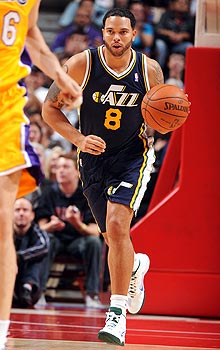
LeBron James and Chris Bosh left their respective teams for a bigger market, more sun and a better chance at winning an NBA championship with the Miami Heat. Carmelo Anthony wants to leave the Rocky Mountains for the bright lights of New York or Chicago. Chris Paul’s representatives told the New Orleans Hornets this summer that he, too, would prefer a trade.
The union of the Heat’s Big Three has spurred a handful of the league’s young All-Stars to think about trying to form their own super teams. So should the Utah Jazz worry about point guard Deron Williams eyeing greener pastures?
Not as long as they keep winning.
“I just want to win,” Williams said. “My team has been winning, for the most part. Last year we got eliminated early, but we just got to get better. We got some pieces to do that. I’m happy right now.
“I’m under contract. I honor that contract, respect that contract and just play basketball. I’m never going to say never. [But] I don’t see that happening.”
Williams is under contract through the 2011-12 season, and has a $17.8 million option for 2012-13 that could be difficult to turn down, particularly if maximum salaries are lowered under a new collective bargaining agreement. If Williams were to want to leave anytime soon, he’d have to try to force a trade.
To their credit, the Jazz have given him little reason to do so. Under the guidance of general manager Kevin O’Conner and coach Jerry Sloan, the Jazz have remained competitive in the tough Western Conference.
Because Salt Lake City ranks 25th among the league’s 30 teams in TV market size, Williams said he’d gain “15-20 million fans the minute you sign” with New York, Los Angeles or Chicago. But he also doesn’t seem consumed with wanting to play under a bigger spotlight.
“Say what you want about small markets,” Williams said. “They are what they are. They have their advantages just like big markets have their advantages and disadvantages.”
On the court, the Jazz have given Williams enough to like about playing in Utah. The team has reached the playoffs the past four seasons, highlighted by a trip to the West finals in 2007. Energy Solutions Arena is always packed and Williams has become the beloved face of the franchise. Utah lost power forward Carlos Boozer, sharpshooter Kyle Korver and guard Wesley Matthews during free agency this summer, but replaced them with young big man Al Jefferson, veteran guards Raja Bell and Earl Watson and rookie forward Gordon Hayward.
“The biggest thing that we’ve had is continuity,” O’Connor said. “Our ownership has agreed to spend the money over the last couple of years whether it’s retaining Paul [Millsap], getting Al Jefferson. We didn’t have to do those things. That’s where it starts and almost where it ends.”
And with Sloan and Williams guiding the Jazz, few doubt they’ll remain competitive.
“I’m comfortable,” Williams said. “We did some things to make our team better and I’m happy with that.”
Utah’s big problem has been running into the defending champion Los Angeles Lakers in the playoffs each of the past three seasons. The Lakers are again heavy favorites to win the West, but it’s anyone’s guess which team will emerge as their top challenger.
The Jazz have the talent to do so, but they’ll also enter the season with a handful of questions that need answering. How long will it take Jefferson to adapt to playing in the Jazz’s system? How many games will center Mehmet Okur(notes) miss before returning from an Achilles injury that cut short last season? Can Hayward make an immediate impact? Will Andrei Kirilenko(notes), who is in the final year of his contract, finish the season with the Jazz?
So far, Williams has liked what he’s seen.
“People are sleeping on us and not including us in the mix,” he said. “That’s fine. We’ve been in that position before and that doesn’t bother us. I think we are better equipped to make a run this year. It’s just going to take some time.”
Williams gives the Jazz a good start. He’s averaged more than 18 points and 10 assists in each of the past three seasons, and declared himself the best point guard in the league during last season’s playoffs. With Paul injured last season, not many people could dispute the claim.
Williams has since tired of the who’s-best debate, knowing he will ultimately be judged on how much he wins.
“Who’s better? The next guy is going to be better,” he said. “We got long careers ahead of us to determine that. I just want to win, just want to help my team anyway I can. Where you are ranked, who thinks who’s better … none of that matters.”
And unlike some of his peers, Williams also isn’t spending much time fretting over his future. He has at least two years left on his contract. Who knows what happens after that?
“If we do all the right things and put a team around him that he can succeed with, then he has to look at [staying],” O’Connor said. “But that’s so far down the road that we don’t even think about it.”






